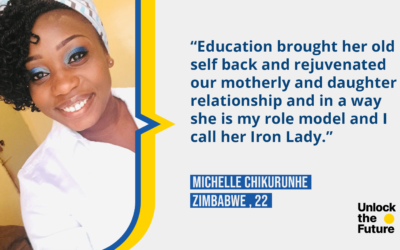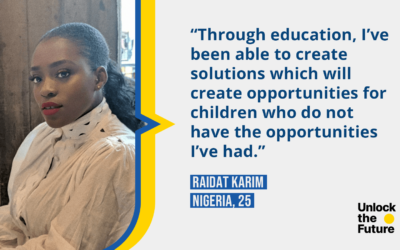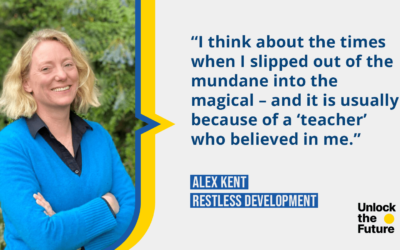“If it wasn’t for education, I’ll still be that homeless street kid in the camp, not even sure that I’ll be here today.“

Tell me about yourself?
I was born in South Sudan but grew up in the streets of Kakuma Refugee Camp, Kenya from the age of two as an orphan. I am a screenwriter and filmmaker currently working with the World Economic Forum as an Assistant Video Producer and a member of the Global Shapers Community, Kakuma Hub. I am also a guide and a mentor at the Studomatrix school platform, where we help school children develop their creative and soft skills, and a refugee voices advocate.
What inspired you to advocate for education?
What inspires me is the resilience I have lived to witness among the refugees in the camp despite the hardship and traumas they have to cope with. I have seen people commit suicide due to growing hopeless and no one wants to talk about it, even the humanitarian agencies. This can be solved by building safe spaces and inclusive educational structures.
What is one personal story that reflects the impact education has had on your life, or the life of someone you know?
When I was in class 7, I got kicked out of school due to not being able to raise Ksh 20 for my exams. I spent almost two years doing nothing before one of the teachers from my community put me back to school. Just a few months into school, my teacher for Religious Education committed suicide and wrote a big note to the entire school and our class. I lost my Mastercard Foundation scholarship to join the University of Cape Town in 2019 just because my supervisor couldn’t write me a referral letter. A year later, after being able to raise my own tuition fees to join campus, I got the same scholarship. I had a discussion with the President of the Mastercard foundation at the Annual Meeting 2020 in Davos and that is how the Mastercard Foundation Scholarship for the refugees living in the camp ended up creating the ongoing scholarship portal. If it wasn’t for education, I’ll still be that homeless street kid in the camp, not even sure that I’ll be here today.
“When I was in class 7, I got kicked out of school due to not being able to raise Ksh 20 for my exams. I spent almost two years doing nothing before one of the teachers from my community put me back to school.”
What is the biggest challenge facing young learners now, and what can we do to address the crisis?
The biggest challenge facing young learners right now is mental health, something that no one wants to talk about. I grew up in the camp and had to witness the body of our friend hanging down the tree on our football training field, a mother burnt herself with kids in the house, school girls giving birth at the age of 13, 14 and parents marrying off their children at least to cater for their families. For us to address these cases, we need to create inclusive and safe schools with safe spaces for the parents, teachers, and students to open up about their mental health. We also need qualified mental health personnel and trained teachers. School nutrition is also something to think about deeply because almost three-quarters of the school population rely on the meals they receive at the school due to the reduced ratio of food given to the refugees and those in the crisis context zone.
All 17 Goals will be reviewed during the SDG Summit in 2023, the largest global moment since the launch of the 2030 Agenda eight years ago. What is your advice to education leaders and young people preparing for post-TES mobilization?
My advice to educational leaders is to try at least once not to think about the donation of the school needs but think about the mental health of the learners, especially in the crisis context zones. The scars and wounds left behind by war are not always visible and these are the things that affect the solitary mind. You can be in a room filled with a thousand people and still feel alone if you are struggling with traumas in your mind. A lot of parents today are still children themselves due to unresolved traumas and this is already endangering the young. To the young people, if we don’t fight for a better tomorrow today, then we are already late. If we don’t do it today, then when? And if it is not us, then who will do it?
“To the young people, if we don’t fight for a better tomorrow today, then we are already late. If we don’t do it today, then when? And if it is not us, then who will do it?”
Who is your superhero that you admire and why?
Angelina Jolie is my superhero. Apart from being the symbol of women’s empowerment, the work she does in helping school children, especially in crisis context zones across the world, is just amazing. She built a school, which is one of the safest and most high-performing girls’ schools in the camp.
Lady Mariemme Jamme, a mother to more than a million girls and boys across the whole world, is my superhero as well. She devoted her skills in computer language and coding to helping those in crisis context zones through the iamtheCODE Project. She has faced human trafficking, become an asylum seeker, and knows what being a homeless person means because she once lived as one.
Joseph on Twitter: @Okelo_sejo


